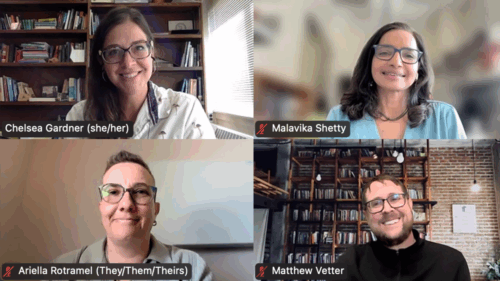Thousands of courses. Millions of words. Billions of page views.
Through the Wikipedia assignment, Wiki Education has supported more than 145,000 postsecondary students across the U.S. and Canada in expanding public access to reliable information worldwide, leaving a powerful mark on the open-access knowledge landscape.
But what kind of impact does learning to edit Wikipedia have on the students themselves – and how do we know?
To tackle these questions and more, last month’s Wiki Education Speaker Series webinar, Studying Impact: How does the Wikipedia assignment shape student learning?, brought together four scholars who have not only taught with Wikipedia but also studied its effects on student learning: Ariella Rotramel (Connecticut College), Chelsea Gardner (Acadia University), Malavika Shetty (Boston University), and Matthew Vetter (Indiana University of Pennsylvania).

Moderated by Wiki Education’s Helaine Blumenthal, the conversation examined what students gain through contributing to Wikipedia, how these learning outcomes have been studied, and the big research questions left to explore.
Rotramel, professor of gender, sexuality, and intersectionality studies at Connecticut College, described how Wikipedia’s neutral point of view requirement challenges students to think critically about bias and knowledge representation.
“Especially in my field, we’re not known for a neutral point of view,” said Rotramel. “So it’s actually a really important element for students to learn what Wikipedia is asking from them – to adequately represent and present sources in a way that [improves] publicly accessible information. It’s a very different style of writing.”
Rotramel’s students often draw from WikiProject Women in Red’s list of missing biographies of notable women, then fill the gaps themselves as part of their coursework. The exercise blends critical inquiry with public impact and merges theory into practice, explained Rotramel.
“If we’re just doing a Wikipedia assignment because I think it’s neat, then that’s not valuable to them,” said Rotramel. “It’s much clearer when I can say, ‘Here’s why we’re doing this, here’s the process, and here’s what I hope you’ll learn.’”
And as fellow panelist Shetty was quick to emphasize, some of the most significant learning outcomes for students center on information literacy and a newfound confidence when evaluating sources.
“It’s really valuable for students to learn how to evaluate sources,” said Shetty. “What is a reliable source? What isn’t a reliable source? How do we differentiate between the two? It’s not just whether it’s physical or digital, but what kind of digital source are we looking at, and can [its claims] be verified?”
Beyond research and writing skills, Shetty explained, the assignment also prompts students to consider critical questions like how is knowledge actually constructed? And who is participating in that process?
“My students come from all over the world,” noted Shetty. “It’s a great assignment to have students work on their own backgrounds and cultures, filling these information gaps. They feel empowered [to] see their work represented on this very public site.”
While panelist Vetter’s earlier research on learning outcomes focused on traditional academic outcomes like writing, research, and digital literacy, his research questions have evolved to explore more abstract concepts, like confidence and boldness, which can be needed for the public-facing coursework.
“The Wikipedia assignment builds humility,” he noted. “This is something I talk to [students] about at the beginning, before we even start working on Wikipedia pages – do not expect that what you put on the page is going to stay on the page. There are people who might take it down, who might add to it and change it.”
Throughout the discussion, the panelists continued to underscore the value of the process itself. Students learn not just by researching and writing, they explained, but by engaging with feedback from Wikipedia’s global editing community and collaborating with other editors.
“The process and collaboration are what really does it, because so many traditional university assignments are unidirectional,” said Gardner. “With the Wikipedia assignment, it’s like, ‘It’s not just done because I handed it in, I have to continue to do this.’ They become more invested and are more likely to continue to do public-facing scholarship.”
This outcome of ongoing investment is something Shetty has also witnessed firsthand. After contributing to a Wikipedia article about deportation from the United States, one of her students decided to become an immigration lawyer.
And while even the most powerful anecdotes don’t always make their way into published research, there’s no doubt that they’ll continue to illustrate just how transformative a Wikipedia assignment can be for students.
Explore research from the panelists:
- Ariella Rotramel’s paper, “Engaging Women’s History through Collaborative Archival Wikipedia Projects“
- Chelsea Gardner’s chapter (co-authored by Victoria Austen), “Wiki Education, the Ancient Mediterranean Classroom, and the Production of Global Knowledge“
- Malavika Shetty’s paper (co-authored by Helen Choi), “Perspectives on Teaching with Wikipedia in Writing Courses Before and During the Pandemic“
- Matthew Vetter’s research
Join our next Speaker Series!
Supercharging Cultural Institution Collections with Wikidata
Thursday, October 23, 2025
12 pm Pacific / 3 pm Eastern
Registration
Interested in incorporating a Wikipedia assignment into your course? Visit teach.wikiedu.org to learn more about the free resources, digital tools, and staff support that Wiki Education offers to postsecondary instructors in the United States and Canada.
